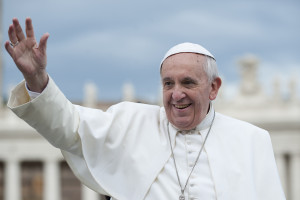 Rome, Italy – You might have expected Roman eyes to be fixed on giant TVs blaring every word, move and inch of the motorcades last week as Pope Francis wowed Washington, New York and Philly.
Rome, Italy – You might have expected Roman eyes to be fixed on giant TVs blaring every word, move and inch of the motorcades last week as Pope Francis wowed Washington, New York and Philly.
Indeed, Italian media coverage of the historic visit was non-stop and intense. However, amid everyday people – in coffee shops, on subways and buses, and in even in crowded piazzas in the capital city – other issues were top of mind.
You might also have thought that hearts would still be filled with pride after two Italians played recently for one of the greatest prizes in pro tennis, the women’s title at the U.S. Open. Surely Italians would have reveled in the fact that Roberta Vinci knocked off the female gladiator, Serena Williams, en route to the final.
Again, few in the streets were talking about it, not only in Rome, but in Venice, Florence and Amalfi as well.
The Wall Street Journal called Pope Francis’ visit “an American debut worthy of a global celebrity.” It was that and more. The pope spoke eloquently on climate change, immigration and religious freedom. He met with victims of sex abuse by priests, and family members of those killed on 9/11.
As for the tennis, Prime Minister Matteo Renzi thought Vinci’s match with ultimate winner Flavia Pannetta was so important, he dropped everything and flew to New York for the match. A few days earlier, an Italian sports reporter said no one back home thought Vinci had a chance.
The thing is, Italy’s a little preoccupied.
Newsweek reported earlier this year that the nation’s public debt is 135 percent of its gross domestic product. Only Japan and Greece are worse off. “Italy’s economy has been in more or less permanent recession since the 2007-08 crash and is now in deflation,” the magazine noted.
A few more telling numbers:
– The economy has shrunk by nearly 10 percent since 2007
– Unemployment is 13.4 percent
– Since 2007, industrial production has fallen by 25 percent
– Only 58 percent of working age Italians have jobs, compared with 65 percent in other developed countries
– Youth unemployment is also high at 43 percent
Meanwhile, more than 15,000 new migrants have landed on Italy’s shores. Renzi wrote recently that his country has already done more than its fair share. “The Mediterranean migrant emergency is not Italy’s,” he said. “It is Europe’s.”
Understanding the larger picture, and factoring in fierce regional pride on display throughout the nation, it’s easier to see why homegrown tennis stars and even a rock star pope are not dominating conversation.
“He’s here all the time,” one businessman shrugged in Rome.
It’s true. Just before his U.S. visit, the pope left the Vatican and turned up at an optometrist’s shop in central Rome to get new glasses. He paid his bill and then stepped outside to greet a large crowd that had formed, the BBC reported.
Italy runs six hours ahead of Washington, New York and Philly. Italians relish their heritage – food, music and art, especially – but are mostly concerned about the same things as everyone else: jobs, the economy and the future. The pope clearly gets it. On the flight home, one reporter asked him what it felt like to be a star.
He said he never sought star status. “Stars are beautiful to look at. I like to look at them in the summer when the sky is clear,” he said. “But the Pope must be … the servant of the servants of God.”
“There’s another truth,” he added. “How many stars have we seen that go out and fall? It’s a fleeting thing. On the other hand, being (the) servant of the servants of God is something that doesn’t pass.”
Read more posts by Steve Piacente, a former print journalist and correspondent. Steve is a blogger for JenningsWire.





